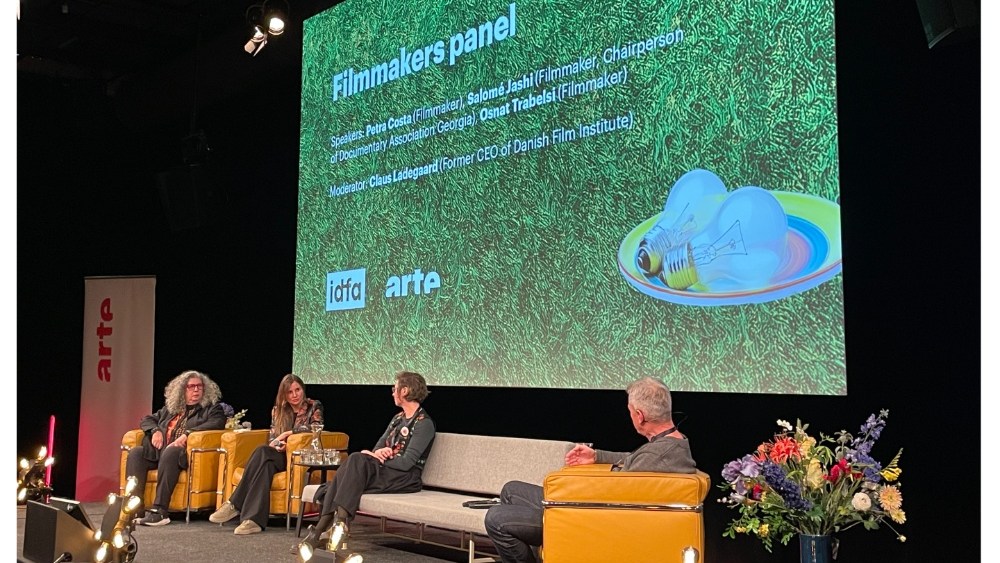Documentary filmmakers and trade leaders gathered at this 12 months’s Amsterdam Worldwide Documentary Movie Pageant, in partnership with French public broadcaster Arte, to debate “Independence and Resistance within the Age of Repressive Populism” on the pageant’s annual European convention. IDFA’s inventive director Orwa Nyrabia launched the convention, highlighting the “growing success” of populist actions in Europe and around the globe, and the way they view filmmakers as “the enemy”.
“They rapidly understand that tradition just isn’t their pal and documentarians are their foremost enemy as a result of we are likely to criticize instantly. They shouldn’t be in a position to cease us,” he mentioned.
There are additionally conditions “like in Germany” the place “it isn’t even the appropriate however the left that’s silencing voices,” Nirabiya added, occurring to say a latest episode by which Berlin’s official metropolis portal described the battle between Israel and Palestine. battle between. Days later, new Berlinale director Tricia Tuttle issued an announcement supporting the movie.
“I wish to make clear that I don’t think about this movie or the feedback made by co-directors Palestinian Basel Adela and Israeli Yuval Abraham on the Berlin Movie Pageant to be anti-Semitic,” the assertion learn. “I additionally imagine that feedback suggesting that this movie or its filmmakers are anti-Semitic poses a hazard to everybody in Germany and past, and it’s important that we stand collectively to assist them.” “
No Different Land is at present screening at IDFA’s Finest Movie Pageant screenings with a particular screening, adopted by a Q&A with Nyrabia and Oscar-winning documentary filmmaker Laura Poitras. Nerabia referred to as the movie “therapeutic” and mentioned “it has been accused of being anti-Semitic, however it’s doing the alternative.”
The subject of movies vital of the Israeli regime being not too long ago labeled anti-Semitic got here up once more within the ensuing dialog, with one of many panelists, Israeli filmmaker Osnat Trabelsi, closing in on the stage. A textual content message from the scene claimed that viewers members had been shouting “Nazi propaganda” whereas watching the film. She was visibly shocked by the replace, including: “Once you criticize Israel, that is what you are accused of. That is the place we come from.
The “1957 Transcript” information the cold-blooded homicide of 49 residents of the Palestinian village of Kaf Qasim in October 1956 by Israeli Border Police troopers. occasion.
Trabelsi spoke of ambivalence about accepting public funds from her dwelling nation, which she referred to as “democracy in disguise.” “[The Israeli government] Wish to say we’re the one democracy within the Center East, however it behaves like a dictatorship. Over the previous decade, it has develop into tough to make movies vital of the federal government. The documentaries I am exhibiting right here would not be funded immediately. We bought funding 10 years in the past.
“There’s additionally censorship of journalism in Israel,” the producer continued. “They do not present what is going on on in Gaza, the general consciousness is totally different from what you see [at IDFA]”. As an Israeli filmmaker making documentaries in regards to the Palestinian trigger navigates complicated political waters, Trabelsi mentioned: “As a perpetrator, it is tough to make a movie a few sufferer. If I’ve the appropriate to say this Tales, I’ll solely make movies about Palestine. [‘The 1957 Transcripts’] Trial protocol is concerned, in any other case I would not be telling this story. That is additionally about ethical choices.
The producer just isn’t the one filmmaker to really feel conflicted about taking cash from state funding businesses. Brazilian director Petra Costa was nominated for an Oscar in 2020 for “The Fringe of Democracy” and debuted at IDFA this 12 months for “Tropical Apocalypse.” inquiries to drive progress. It is a political persecution that makes me really feel insecure immediately in Brazil in the case of accessing state funds, though we’re beneath a democratic authorities.
“What if we return two years later to once I was so vital of the federal government?” she posed, earlier than recalling that the day she obtained information of her Oscar nomination, she could not rejoice as a result of she was on X and Twitter trended as a “traitor to the Brazilian authorities”, with a congressman and Bolsonaro supporters calling for her arrest on expenses of “treason towards the nation”.
“We’ll see what occurs. [President] Lula is once more investing cash in tradition, however it’ll take a very long time. Many filmmakers have had their careers destroyed and will not be certain what’s going to occur in two years,” Costa concluded.
Filmmaker Salome Jahi, chairman of the Documentary Affiliation of the Republic of Georgia, mentioned there was “no alternative” whether or not to conform to obtain public funds for Georgian documentary filmmakers. By way of the affiliation, administrators have created a united entrance throughout the nation to say no to public funding. “We don’t wish to work with a authorities that marginalizes social teams like queer individuals,” Jassy mentioned. “It is a measure of solidarity. Proper now, filmmaking is a political act. Even the place you purchase your espresso now could be political.
When requested about potential options or alternate options for the way documentary makers can fight populism, the filmmakers had been uncertain if there have been any particular options at hand, however all agreed that if audiences don’t watch documentaries, then making documentaries “ not sufficient”. “We should do extra to reconnect with grassroots activism, in any other case the working class will likely be weak to the poison of fascism,” Costa burdened.

